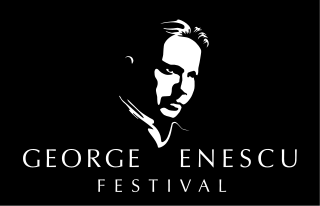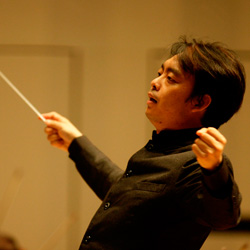Related Research Articles

Cluj-Napoca, or simply Cluj, is a city in northwestern Romania. It is the second-most populous city in the country and the seat of Cluj County. Geographically, it is roughly equidistant from Bucharest, Budapest and Belgrade. Located in the Someșul Mic river valley, the city is considered the unofficial capital of the historical province of Transylvania. For some decades prior to the Austro-Hungarian Compromise of 1867, it was the official capital of the Grand Principality of Transylvania.
The San Jose Youth Symphony (SJYS) is a non-profit youth orchestra located in San Jose, California.

The Romanian National Opera, Cluj-Napoca is one of the national opera and ballet companies of Romania. The Opera shares the same building with the National Theatre in Cluj-Napoca.

The George Enescu Philharmonic Orchestra is a musical institution located in Bucharest, Romania.

The Moldova Philharmonic Orchestra is a Romanian symphony orchestra located in Iași, Romania. The name "Moldova" in the title refers to the historical region of Moldavia.

The George Enescu Festival, held in honor of the celebrated Romanian composer George Enescu, is the biggest classical music festival and classical international competition held in Romania and one of the biggest in Eastern Europe. The festival proposal was authored by Andrei Tudor in 1955. Enescu's close associate George Georgescu organized the first festival in 1958; highlights included a performance of Bach's Concerto for Two Violins with Yehudi Menuhin and David Oistrakh as soloists and a staging of Enescu's sole opera, Œdipe, with Constantin Silvestri conducting.

Eduard Topchjan is an Armenian conductor, the principal conductor and artistic director of the Armenian Philharmonic Orchestra.

Ghenadie Ciobanu is a composer and politician from the Republic of Moldova, who served as the Minister of Culture of the Republic of Moldova (1997-2001) and served as a deputy in the Parliament of the Republic of Moldova in the Party faction Liberal Democrats from Moldova between 2010 and 2014. He composed symphonies, written works for chamber ensembles (instrumental), choral creations, theater and film music, etc.

Valentin Radu is founder, artistic director and conductor of Vox Ama Deus, with performances at the Kimmel Center in Philadelphia and other various city, suburban, and Main Line area venues, has led numerous orchestras and vocal ensembles in Europe and the U.S., including the Hungarian National Philharmonic, Bucharest, Arad, Oradea Philharmonics, the Budapest Chamber Orchestra and the Romania National Radio Orchestra. In 1996 he conducted the Bucharest Philharmonic in Handel's Messiah, and in 1997 led the Romanian National Radio Orchestra in Handel's Acis and Galatea.

Gabala International Music Festival is an annual festival of classical music held every summer beginning in 2009 in Gabala, Azerbaijan. The festival is organised with the support of Heydar Aliyev Foundation at the initiative of the rector of the Baku Academy of Music Farhad Badalbeyli and conductor Dmitri Yablonski. At this festival, musicians perform in the open air. Participants have included musicians from Europe, the US and Israel, as well as musicians from republics of the former USSR. In 2009, a contest of young pianists was held at the same time with the musical festival. Jazz and mugham evenings were held along with classical music concerts. In 2010, the festival was held on August. General director of UNESCO Irina Bokova was in the opening ceremony of the festival. The festival began with the performance of overture from Uzeyir Hajibeyov's "Koroglu" opera as in 2009. Opening ceremony of the festival was charged to Royal Philharmonic Orchestra. Such musicians as Dmitri Yablonski, Yuri Bashmet, Khloe Khanslip and other Azerbaijani and foreign musicians took part in the festival. In 2011, the festival lasted from July 15 to August 5.
The Xiamen Philharmonic Orchestra (XPO) Chinese: (厦门爱乐乐团) is based in Xiamen, Fujian Province, the People's Republic of China. It is one of the top orchestras in China, and the only non-state-owned and self-financing orchestra in the country. Founded in 1998, XPO plays the majority of its concerts at Music Island Philharmonic Hall, Xiamen. XPO's founder is Zheng Xiaoying, and the current artistic director is Fu Renchang.

Hirofumi Yoshida is a Japanese orchestral conductor. He resides in Italy, but grew up in Funabashi, Chiba, Japan.

Emil Simon was a Romanian conductor and composer.

Alfonso Maribona is an orchestra conductor, pianist, composer and arranger. Maribona was born in Bilbao, and finished his piano and chamber music qualifications at the Royal Conservatory of Music in Madrid, at the same time winning First Prize at the End of Postgraduate Course by a unanimous decision. In 1982 he obtained Second Prize at the National Piano Competition, then in 1985 he was awarded First Prize at the same competition. In 1991 he won First Prize at the "Ciudad de Manresa" National Chamber Music Competition, and in the same year, by a unanimous jury verdict, he gained First Prize at the National Chamber Music Competition of Spain.
The Chicago Philharmonic is an American orchestra based in Chicago, Illinois, governed by the Chicago Philharmonic Society. Founded in 1988 by principals of the Lyric Opera Orchestra of Chicago, it is a musician-governed, non-profit organization consisting of nearly 200 classical music performers from the Chicago area. Since 2013, the Artistic Director and Principal Conductor has been Scott Speck.

Grigor Palikarov is a Bulgarian conductor, composer, pianist and music educator.
Stefan Geiger is a German conductor and trombonist. In 2016 he became the conductor and music director of Orquestra Sinfônica do Paraná in Curitiba.

The Academic Symphony Orchestra of the Lviv National Philharmonic is one of the oldest symphony orchestras in Ukraine.

Brașov Philharmonic in Brașov, Romania, is a musical institution founded in 1878 under the name “Kronstaedter Philharmonische Gessellschaft,” with the aim of supporting classical music in Brașov.